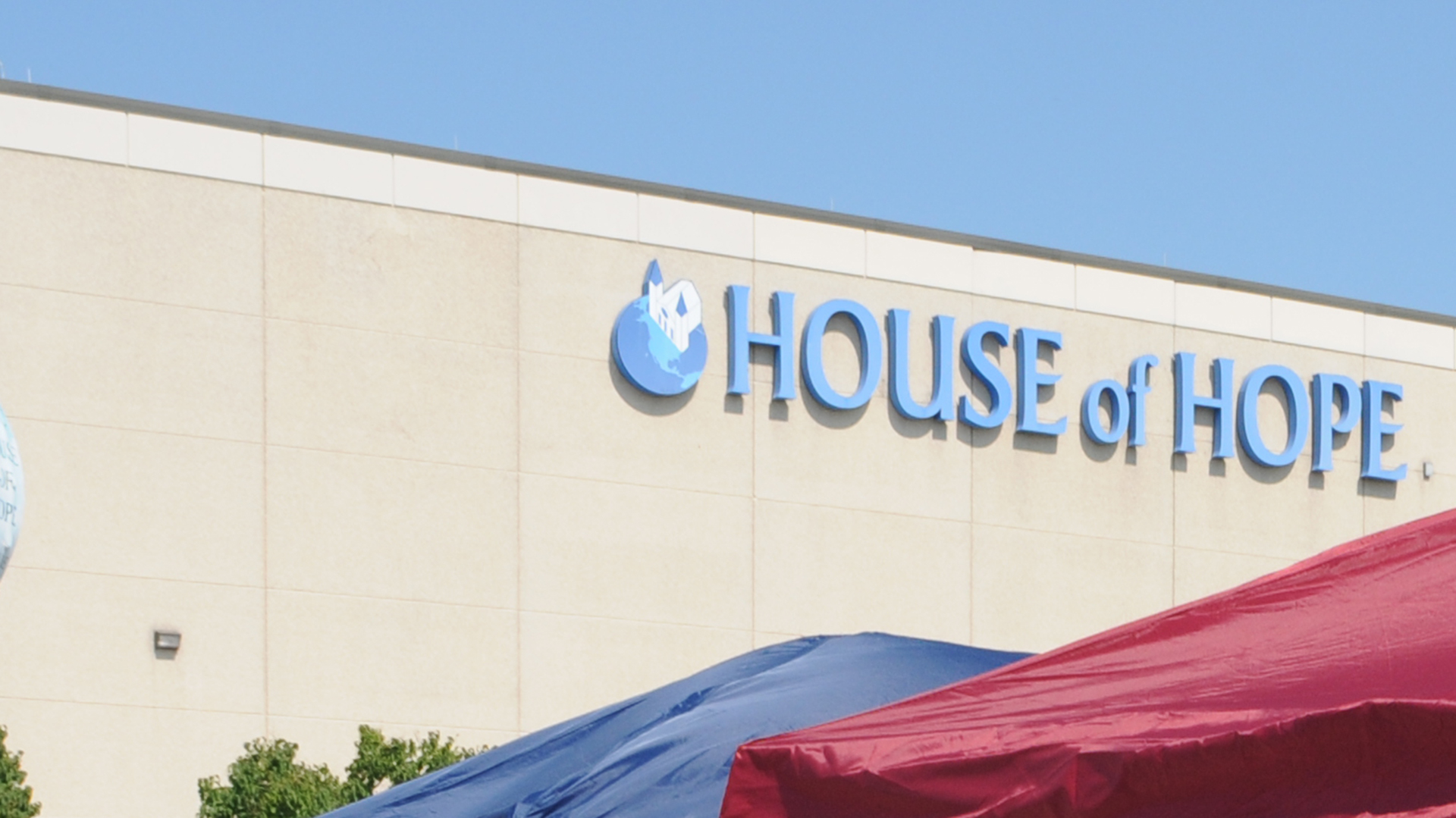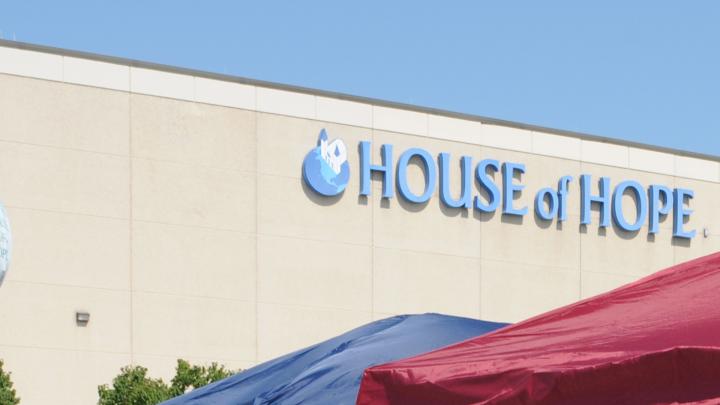WBA’s Strategy and Transformation Officer of Technology Maria Lensing shares wisdom she’s learned from her career and her heritage.
Global Impact
A whole lot of hope
Walgreens and Salem Baptist Church of Chicago team up to serve their local community and help prepare for flu season amid the global pandemic.


It’s hard to miss House of Hope when you take I-94 to the South Side of Chicago.

The sprawling 200,000-foot arena, which was modeled after the Chicago Bulls’ United Center, has been a beacon of light and a gathering place for the local community since it opened in 2005. But it’s not slam dunks and buzzer-beaters that pack the 10,000 stadium-style seats each week. It’s the stirring sermons of senior pastor Rev. James Meeks.
“This church is the hub of our community, and especially the African-American community,” says Jamell Meeks, the wife of the pastor, affectionately known as the First Lady of the church. “It’s where all the generations of people know they can come for help with their issues and come to share their joys and sorrows.”
And that’s exactly the role Salem Baptist Church, the organization behind House of Hope, has played for many residents of the nearby Roseland and Pullman neighborhoods. But with weekly services shifting online beginning in March, House of Hope hasn’t been able to open its physical doors to the community in quite some time.
So they opened the parking lot.
Connecting with the community
Salem Baptist Church was one of nine Chicagoland churches to participate in an immunization pilot conducted by the Illinois Department of Health. In late August, church parking lots across the South and West Sides of Chicago were converted into outdoor clinics. Several federally qualified health centers conducted drive-thru COVID-19 testing; Blue Cross Blue Shield of Illinois provided medical education; and Walgreens pharmacists administered flu shots and blood pressure tests. All available to members of the community, all for free.
The idea for this pilot came about when Col Dr. Damon Arnold, MD, MPH, CMT (Ret.), former director of the Illinois Department of Public Health, was brought in to assist with the state’s response to COVID-19 in March.
“The current Illinois Public Health director, Dr. Ngozi Ezike, and I were worried about the prospect of people getting COVID-19 and the flu at the same time this fall, which would be devastating,” says Arnold. “Our healthcare system could potentially be overrun. The U.S. typically has between 24,000 and 62,000 deaths annually just from influenza, and so far this year we have over 180,000 deaths from COVID-19 nationally, so this is a way to step up in limiting the impact of a largely preventable illness.”
In particular, Arnold says, there was extra concern around trying to vaccinate the vulnerable and underserved. The pandemic-related closures of many medical centers and doctors’ offices in certain communities have already led to a reported decrease in the number of all vaccinations given so far this year, including flu. And these same neighborhoods tend to have traditionally low vaccination rates due to factors such as limited access to services and a lack of trust between some community members and care providers.

So in order to generate enough participation within these local communities, Arnold knew it would be necessary to engage local partners who were known, respected and most importantly trusted by their neighbors.
Ladies first
Perhaps nobody is more trusted in the neighborhood than the pastor, Rev. Meeks. And there’s nobody he trusts more than his First Lady. In addition to her role leading the women’s ministry, Jamell heads up community health initiatives for Salem Baptist Church. She also serves as National Chair for the First Ladies’ Health Initiative, sponsored by Walgreens, which operates in more than 200 churches across the country, working to bring essential health services to people in a place they feel comfortable in and can easily access.
“We turn all our sanctuaries into mini health clinics,” Jamell says. “On any given Sunday in the late summer and fall, a First Lady is running one of these clinics somewhere. There are so many people in all our communities without health insurance, and especially now, so this gives us a big opportunity to meet their needs.”
For over 12 years, members of the First Ladies’ Health Initiative have used their positions of leadership to help make sure their congregation’s physical health is taken care of, in addition to their spiritual well-being.
“The reason we’ve been successful is because we have those trusted voices,” says Tracey Alston, founder of the First Ladies’ Health Initiative. “If the pastor is the father, then the pastor’s wife is the mother of the church, and those are the trusted voices that really care for the community.”

So for Arnold, partnering with Rev. and Jamell Meeks, Alston and the First Ladies’ Health Initiative made the most sense in terms of gaining trust and driving turnout. But he needed an equally trusted and respected local partner to supply and administer the vaccinations themselves.
He didn’t need to look any further than First Ladies’ title sponsor: Walgreens.
“Walgreens not only has pharmacists who are trained to provide vaccinations, but they are respected in the community,” Arnold explains. “The access points are there, the expertise is there, and those relationships they’ve built up in their communities over the years – it's a trusting relationship that’s developed over time. I feel it every time I walk into my local Walgreens.”
The church and the corner store
Stephen Fadowole knows all about building that trusting relationship with his patients and customers. He’s the pharmacy manager at the Walgreens on 86th and Cottage Grove Ave., approximately one mile up the road from the House of Hope. At the recent immunization pilot, he managed the team of volunteers doing clerical work, and pharmacists and pharmacy interns administering the flu shots and running the blood pressure tests.
“One thing about my Walgreens location is our ability to integrate with the community through our great relationship with the church,” Fadowole says. “We’re talking about a church with 17,000 parishioners. So if we can inoculate even just 1,000 of them, think about the impact that can have. Not only that, but each person we vaccinate can also help to spread the word throughout the community.”

Fadowole also understands the important role that the church and Rev. Meeks play in getting as many people vaccinated as possible by delivering the message to receptive ears.
“When it’s the pastor telling people that it’s important to come get their flu shot, it’s just received differently,” Fadowole says. “So he delivers the message, and then we come and provide the services. It’s a match made in heaven.”
But even a match made in heaven can use a little bit of help. Enter John Gremer.

Gremer, director of community affairs for Walgreens, has worked with the First Ladies’ Health Initiative for the past decade, and worked with Arnold to launch the immunization pilot.
“Our folks in the stores are out there directly serving patients and customers every day,” says Gremer. “But it isn’t very often that our team members from the main office get to do it, so I thought this could be a great opportunity for those of us at corporate to say we care, too.”
Gremer put out a call across the Walgreens corporate campus to see if any of his colleagues would donate their time and volunteer for this cause. He was delighted to see dozens of responses immediately come in.
Attending service
One of those responses came from Darion Cranfield, a senior manager in property and store planning at Walgreens, who was no stranger to the House of Hope.
As a freshman at the University of Illinois at Chicago, he’d pile into the car with his friends and drive to House of Hope, making sure never to miss Wednesday night bible study.
Cranfield, who is also Chair of the African-American Leadership Network Business Resource Group at Walgreens, received Gremer’s request as part of an email blast sent to members of all Business Resource Groups.
“Rev. Meeks’ services were always so important to me growing up,” says Cranfield, who started his career working as a pharmacy technician in a Walgreens. “So when I saw Salem Baptist Church on the list of sites, I jumped at the opportunity to go.”

Cranfield spent a Thursday afternoon beneath the late August sun running paperwork and patients back and forth from the immunization tent. He was hot, sweaty and tired – but didn’t miss his air-conditioned seat in front of the computer all that much. He once again found himself at House of Hope, but instead of attending a service, he was providing one.
“Doing that reconnected me to a community that’s done wonders for me, personally,” he says. “This church gives people around here the hope that they need. Events like this, they give people hope that even during a pandemic, even during times like these, they can rely on their church and they can rely on Walgreens to get that care they need.”